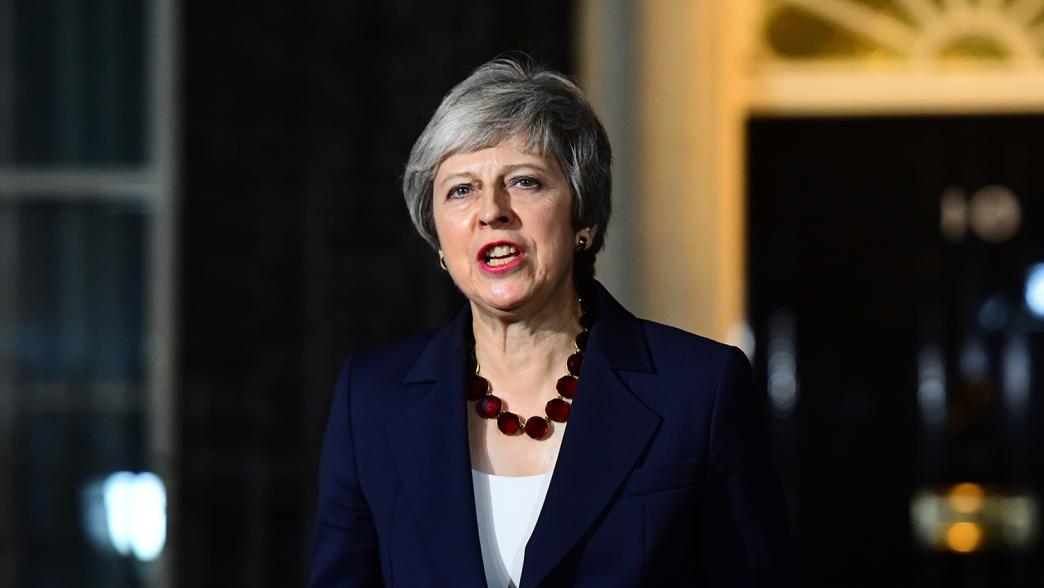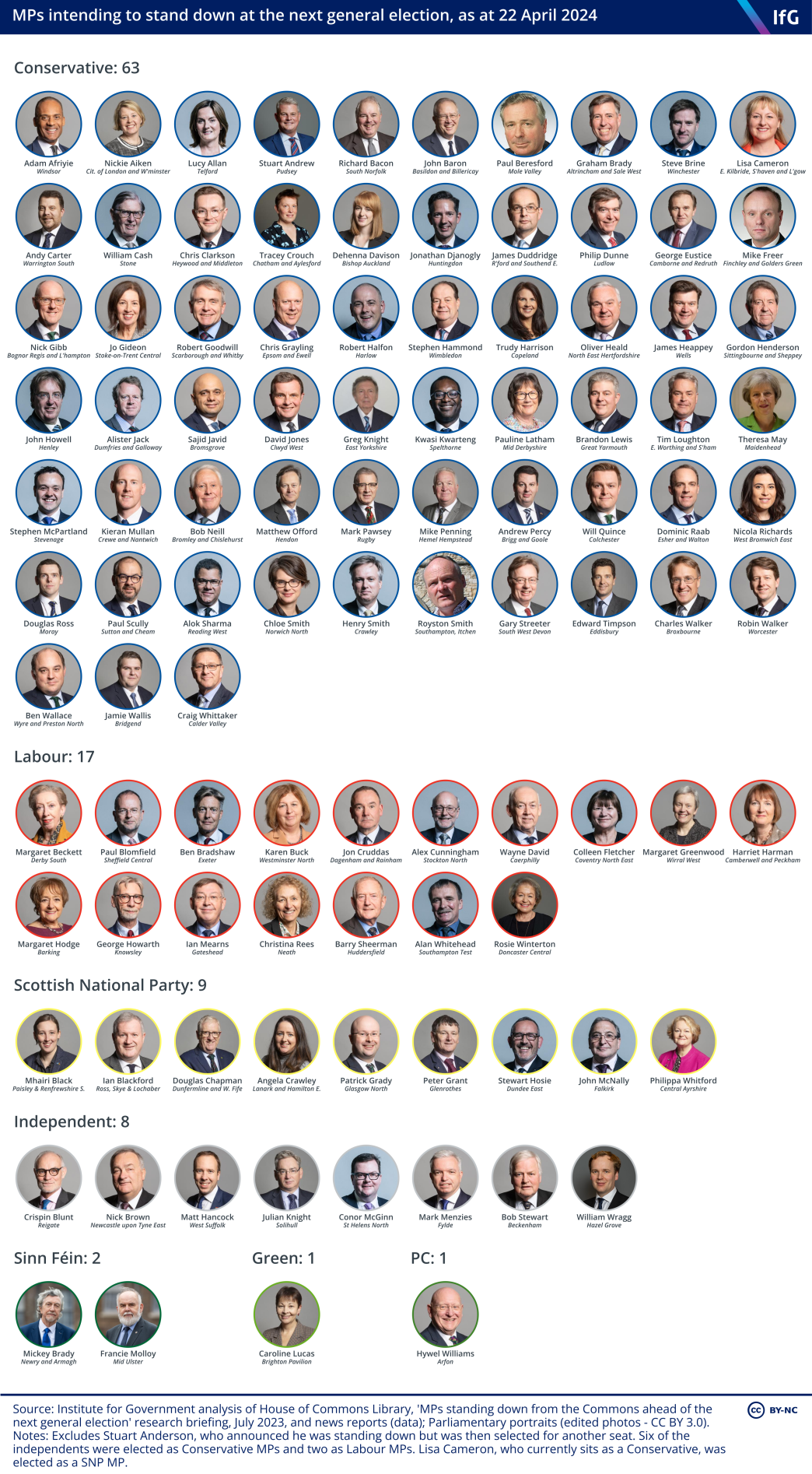MPs standing down at the next general election
How many MPs are standing down at the next election, and why?

How many MPs are standing down at the next election?
As of 22 April 2024, 101 MPs have announced that they will not stand again at the next general election. The most recent MP to announce they are standing down was Mark Menzies, who has been the MP for Fylde since 2010 and who quit the Conservative party over allegations he had misused campaign funds.
A number of prominent MPs plan to stand down, including 16 who have been secretaries of state. Former prime minister Theresa May, former deputy prime minister Dominic Raab and former health secretary Matt Hancock all plan to stand down, as do former Labour ministers Harriet Harman and Dame Margaret Hodge. They are joined by the former Westminster leader of the SNP, Ian Blackford, current deputy speaker, Dame Rosie Winterton, and the chairs of nine select committees.

Which parties do they belong to?
Most of the MPs who are standing down are Conservatives – 63 of the 101 MPs who have made a public announcement to date. In addition, six of the eight independent MPs who are retiring were first elected as Conservatives. This is unsurprising, as there are more Conservative MPs than MPs for any other party.
But while the Conservatives account for the largest number of MPs standing down, they will not be the party with the highest proportional turnover at the next election. The nine SNP MPs planning to stand down equate to more than a fifth (21%) of the parliamentary party; the Conservatives’ 63 just 18%. The Green Party’s sole MP, Caroline Lucas, has also announced she will not stand in the next election, as has Hywel Williams, one of only three Plaid Cymru MPs.
How many MPs usually stand down at general elections?
The 2010 election saw almost 150 MPs stand down, mainly from the Labour Party, which had been in power since 1997. Some of these MPs had announced that they would stand down in response to the expenses scandal of that same year.
If the election is unexpected, MPs have less time to consider whether to stand down – something that will have contributed to higher numbers of MPs standing down in 2010 and 2015 than at the snap elections of 2017 and 2019.
While some prominent parliamentarians are stepping down at the next election, the number of retiring MPs is currently lower than in 2010, although it is likely to increase as the election approaches.
How long have the MPs standing down been in the Commons?
Conservative MPs who are standing down are most likely to be from the 2010 intake, as the party gained a lot of MPs at that election: almost 25% of current Conservative MPs are drawn from that cohort. Most SNP MPs stepping down are from the 2015 intake for similar reasons, with more than two-thirds of the party’s current MPs elected in that year.
However, 11 MPs from the 2017 and 2019 intakes – all Conservatives – are stepping down too, despite a relatively short period in parliament. These include MPs like Dehenna Davison, MP for Bishop Auckland, and Nicola Richards, MP for West Bromwich East, who won seats in traditional Labour strongholds in 2019.
Why are MPs standing down from parliament?
Some MPs are retiring from politics after having had long careers in the Commons. Barry Sheerman, the oldest sitting Labour MP, is planning to retire after 45 years in parliament. Similarly, Harriet Harman, the longest serving female MP, is leaving politics after four decades in office.
Many of those stepping down, however, are comparatively young. SNP MP Mhairi Black, once parliament’s youngest MP and still in her 20s, has announced that she does not intend to stand for parliament again. Other relatively young MPs are planning to stand down despite having become ministers, like Davison, or select committee chairs, like Robin Walker, during the course of this parliament.
Many MPs have cited personal reasons for standing down, like mental health struggles or a desire to spend more time with their families. Others have been critical of parliament itself. Black, for instance, described Westminster culture as "outdated, sexist and toxic". 13 Cochrane A, ‘Mhairi Black to step down as SNP MP at next election’, BBC News, 4 July 2023, www.bbc.co.uk/news/uk-scotland-66101123 Stuart Anderson said threats against his family had influenced his decision not to seek re-election in Wolverhampton South West, 14 Collins R and Glinka E, ‘Two Conservative Black Country MPs to step down at election’, BBC News, 28 March 2023, www.bbc.co.uk/news/uk-england-birmingham-65097041 although he subsequently has been chosen as a candidate for the seat of South Shropshire instead. 15 Dawkins A, ‘MP Stuart Anderson selected as candidate in different area’, BBC News, 25 July 2023, www.bbc.co.uk/news/uk-england-shropshire-66300464
Some MPs’ decisions may also have been prompted by the changes to constituency boundaries which will be in place for the next election, which have meant they may have faced a reselection battle to find a new constituency. For instance, Jonathan Djanogly, MP for Huntingdon, announced he was standing down after he was unsuccessful in securing automatic re-adoption as a candidate in a new seat. 16 Atkinson W, ‘Djanogly de-selected in Huntingdon. Once again, boundary changes proved the crucial factor’, Conservative Home, 4 April 2023, https://conservativehome.com/2023/04/04/djangoly-de-selected-in-huntingdon-once-again-boundary-changes-proved-the-crucial-factor/
Other MPs might simply be sceptical of their chances of winning re-election. Many of the announcements from Conservative MPs have come in the past year, during which time Labour has enjoyed a sustained poll lead, while departing SNP MPs may have been influenced by the party’s decline in the polls throughout 2023.
Which seats are MPs standing down from?
- Political party
- Conservative Labour Liberal Democrat Green Party Scottish National Party
- Administration
- Sunak government Blair government Brown government Cameron government Cameron-Clegg coalition government
- Legislature
- House of Commons
- Public figures
- Kwasi Kwarteng Dominic Raab Gordon Brown Ben Wallace
- Publisher
- Institute for Government